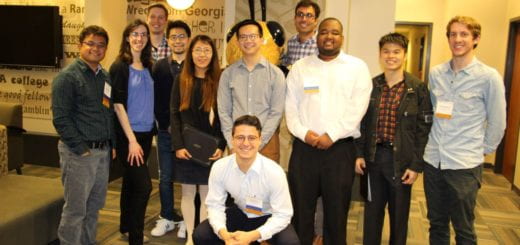GTREET 2020
Here’s a question: How might we move beyond (unhelpful) traditional educational structures to build a culture of challenge, meaningful experience, and academic wellbeing for our Georgia Tech students?
Pretty big, and possibly loaded, question, right? This is the question that framed CTL’s biennial Georgia Tech Retreat on Effective Teaching – GTREET – which we hosted on January 17th, 2020. This event is an opportunity for Tech and CTL faculty across campus to come together for an extended workshop session to deal with a specific issue or opportunity related to teaching and learning. Held from 10-2, we had a solid block of time to work together and really allow participants to talk to and collaborate with peers they might not usually talk to or see on campus.
 To kick off the event, Dr. Susan Blum, professor of anthropology at the University of Notre Dame, shared her journey from a very traditional professor to one who subversively resists some of the taken-for-granted constraints of higher education – she doesn’t give her students grades. Dr. Blum’s original research area was Chinese culture, but she has been studying higher education for the last ten years, resulting in her book on plagiarism and the 2017 “I Love Learning, I Hate School”: An Anthropology of College as well as a forthcoming college on the idea of “ungrading.” She explored how curiosity and motivation are bent toward grades in our current educational system which not only makes learning laborious, but also “schooling,” not “learning.” She talked through a variety of shifts faculty can make in their perspectives about the classroom and shared her strategy for ungrading her students
To kick off the event, Dr. Susan Blum, professor of anthropology at the University of Notre Dame, shared her journey from a very traditional professor to one who subversively resists some of the taken-for-granted constraints of higher education – she doesn’t give her students grades. Dr. Blum’s original research area was Chinese culture, but she has been studying higher education for the last ten years, resulting in her book on plagiarism and the 2017 “I Love Learning, I Hate School”: An Anthropology of College as well as a forthcoming college on the idea of “ungrading.” She explored how curiosity and motivation are bent toward grades in our current educational system which not only makes learning laborious, but also “schooling,” not “learning.” She talked through a variety of shifts faculty can make in their perspectives about the classroom and shared her strategy for ungrading her students
After lunch, participants worked through a variety of design thinking activities to think beyond structures like grading and consider how we can reveal our students’ interest, curiosity, and superpowers. For example, we asked what participants would change about higher ed if they had a magic wand (…the most common answer was grades). We talked about which elements of Tech culture we can see and what is lurking below the surface impacting how we teach and how our students learn. We imagined what superpowers are students have that we can tap into and ended with an activity to brainstorm easy, exciting, and outrageous steps each participant could enact after GTREET.
Attendees were actively engaged and reported feeling inspired at the end of the retreat, and we look forward to learning how that inspiration turned into action this semester.
If you missed GTREET, be on the lookout for news about our May retreat event – we’re hosting Dr. Joshua Eyler for a day of thinking about brain-based learning and grading practices.




